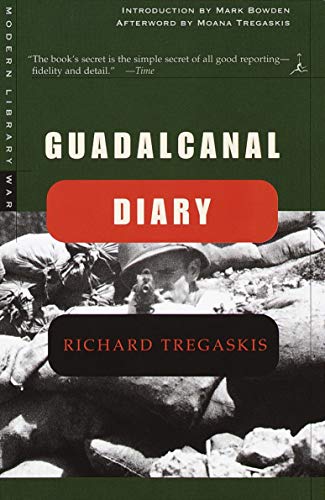-
Plutarch's Lives Volume 1
Plutarch, Arthur Hugh Clough, John Dryden, James Atlas
Paperback (Modern Library, April 10, 2001)Plutarch's Lives, written at the beginning of the second century A.D., is a brilliant social history of the ancient world by one of the greatest biographers and moralists of all time. In what is by far his most famous and influential work, Plutarch reveals the character and personality of his subjects and how they led ultimately to tragedy or victory. Richly anecdotal and full of detail, Volume I contains profiles and comparisons of Romulus and Theseus, Numa and Lycurgus, Fabius and Pericles, and many more powerful figures of ancient Greece and Rome.The present translation, originally published in 1683 in conjunction with a life of Plutarch by John Dryden, was revised in 1864 by the poet and scholar Arthur Hugh Clough, whose notes and preface are also included in this edition.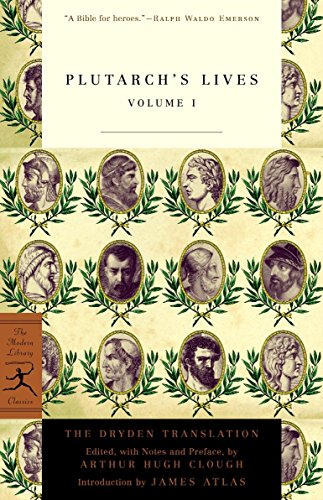
-
California: A History
Kevin Starr
Paperback (Modern Library, March 13, 2007)“A California classic . . . California, it should be remembered, was very much the wild west, having to wait until 1850 before it could force its way into statehood. so what tamed it? Mr. Starr’s answer is a combination of great men, great ideas and great projects.”—The EconomistFrom the age of exploration to the age of Arnold, the Golden State’s premier historian distills the entire sweep of California’s history into one splendid volume. Kevin Starr covers it all: Spain’s conquest of the native peoples of California in the early sixteenth century and the chain of missions that helped that country exert control over the upper part of the territory; the discovery of gold in January 1848; the incredible wealth of the Big Four railroad tycoons; the devastating San Francisco earthquake of 1906; the emergence of Hollywood as the world’s entertainment capital and of Silicon Valley as the center of high-tech research and development; the role of labor, both organized and migrant, in key industries from agriculture to aerospace. In a rapid-fire epic of discovery, innovation, catastrophe, and triumph, Starr gathers together everything that is most important, most fascinating, and most revealing about our greatest state. Praise for California“[A] fast-paced and wide-ranging history . . . [Starr] accomplishes the feat with skill, grace and verve.”—Los Angeles Times Book Review“Kevin Starr is one of california’s greatest historians, and California is an invaluable contribution to our state’s record and lore.”—MarIa ShrIver, journalist and former First Lady of California “A breeze to read.”—San Francisco
-
Out of Africa
Isak Dinesen
Hardcover (Modern Library, Sept. 5, 1992)Selected by the Modern Library as one of the 100 best nonfiction books of all timeIn this book, the author of Seven Gothic Tales gives a true account of her life on her plantation in Kenya. She tells with classic simplicity of the ways of the country and the natives: of the beauty of the Ngong Hills and coffee trees in blossom: of her guests, from the Prince of Wales to Knudsen, the old charcoal burner, who visited her: of primitive festivals: of big game that were her near neighbors--lions, rhinos, elephants, zebras, buffaloes--and of Lulu, the little gazelle who came to live with her, unbelievably ladylike and beautiful. The Random House colophon made its debut in February 1927 on the cover of a little pamphlet called "Announcement Number One." Bennett Cerf and Donald Klopfer, the company's founders, had acquired the Modern Library from publishers Boni and Liveright two years earlier. One day, their friend the illustrator Rockwell Kent stopped by their office. Cerf later recalled, "Rockwell was sitting at my desk facing Donald, and we were talking about doing a few books on the side, when suddenly I got an inspiration and said, 'I've got the name for our publishing house. We just said we were go-ing to publish a few books on the side at random. Let's call it Random House.' Donald liked the idea, and Rockwell Kent said, 'That's a great name. I'll draw your trademark.' So, sitting at my desk, he took a piece of paper and in five minutes drew Random House, which has been our colophon ever since." Throughout the years, the mission of Random House has remained consistent: to publish books of the highest quality, at random. We are proud to continue this tradition today. This edition is set from the first American edition of 1937 and commemorates the seventy-fifth anniversary of Random House.
-
The Killer Angels: A Novel of the Civil War
Michael Shaara
Hardcover (Modern Library, Nov. 2, 2004)A reissue of a Pulitzer prize-winning classic, and now the major motion picture GETTYSBURG. As a result of these acclamations, this book is considered one of the greatest novels written on the Civil War.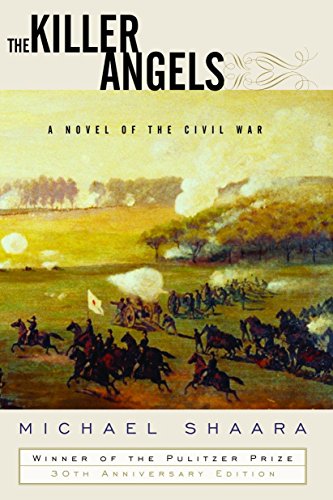
-
The Civil War Trilogy Box Set: With American Homer: Reflections on Shelby Foote and His Classic The Civil War: A Narrative
Shelby Foote, Jon Meacham
Hardcover (Modern Library, March 23, 2011)Selected by the Modern Library as one of the 100 best nonfiction books of all timeOn the occasion of the 150th anniversary of the Civil War, the Modern Library publishes Shelby Foote’s three-volume masterpiece in a new boxed set including three hardcovers and a new trade paperback, American Homer: Reflections on Shelby Foote and His Classic Civil War: A Narrative, edited by and with an introduction from Pulitzer Prize winner Jon Meacham and including essays by Michael Beschloss, Ken Burns, Annette Gordon-Reed, and others. Random House publisher Bennett Cerf commissioned southern novelist Shelby Foote to write a short, one-volume history of the American Civil War. Thirty years and a million and a half words later—every word having been written out longhand with nib pens dipped into ink—Foote published the third and final volume of what has become the classic narrative of that epic war. As he approached the end of the final volume, Foote recounted this scene in a letter to his friend, the novelist Walker Percy: “I killed Lincoln last week—Saturday, at noon. While I was doing it (he had his chest arched up, holding his last breath to let it out) some halfassed doctor came to the door with vols I and II under his arm, wanting me to autograph them for his son for Xmas. I was in such a state of shock, I not only let him in; I even signed the goddam books, a thing I seldom do. Then I turned back and killed him and had Stanton say, ‘Now he belongs to the ages.’ A strange feeling, though. I have another 70-odd pages to go, and I have a fear they’ll be like Hamlet with Hamlet left out. Christ, what a man. It’s been a great thing getting to know him as he was, rather than as he has come to be—a sort of TV image of himself, with a ghost alongside.” When Percy read the final book, he wrote to Foote: “It’s a noble work. I’m still staggered by the size of the achievement. . . . It is The Iliad.” A selection of these letters, along with essays by Jon Meacham, Michael Beschloss, Ken Burns, Annette Gordon-Reed, Michael Eric Dyson, Julia Reed, Robert Loomis, Donald Graham, John M. McCardell, Jr., and Jay Tolson, are included in American Homer, the bonus paperback book available only in the Modern Library boxed set of The Civil War. Shelby Foote’s tremendous, sweeping narrative of the most fascinating conflict in our history—a war that lasted four long, bitter years, an experience more profound and meaningful than any other the American people have ever lived through—begins with Jefferson Davis’s resignation from the United States Senate and Abraham Lincoln’s departure from Springfield for the national capital. It is these two leaders, whose lives continually touch on the great chain of events throughout the story, who are only the first of scores of exciting personalities that in effect make The Civil War a multiple biography set against the crisis of an age. Four years later, Lincoln’s second inaugural sets the seal, invoking “charity for all” on the Eve of Five Forks and the Grant-Lee race for Appomattox. Here is the dust and stench of war, a sort of Twilight of the Gods. The epilogue is Lincoln in his grave, and Davis in his postwar existence—“Lucifer in Starlight.” So ends a unique achievement—already recognized as one of the finest histories ever fashioned by an American—a narrative that re-creates on a vast and brilliant canvas the events and personalities of an American epic: the Civil War.
-
Dialogue Concerning the Two Chief World Systems: Ptolemaic and Copernican
Galileo Galilei, Stillman Drake, Stephen Jay Gould, J. L. Heilbron, Albert Einstein
Paperback (Modern Library, Oct. 2, 2001)Galileo’s Dialogue Concerning the Two Chief World Systems, published in Florence in 1632, was the most proximate cause of his being brought to trial before the Inquisition. Using the dialogue form, a genre common in classical philosophical works, Galileo masterfully demonstrates the truth of the Copernican system over the Ptolemaic one, proving, for the first time, that the earth revolves around the sun. Its influence is incalculable. The Dialogue is not only one of the most important scientific treatises ever written, but a work of supreme clarity and accessibility, remaining as readable now as when it was first published. This edition uses the definitive text established by the University of California Press, in Stillman Drake’s translation, and includes a Foreword by Albert Einstein and a new Introduction by J. L. Heilbron.
-
Basic Writings of Nietzsche
Friedrich Nietzsche, Walter Kaufmann
eBook (Modern Library, Feb. 23, 2011)Introduction by Peter GayTranslated and edited by Walter Kaufmann Commentary by Martin Heidegger, Albert Camus, and Gilles Deleuze One hundred years after his death, Friedrich Nietzsche remains the most influential philosopher of the modern era. Basic Writings of Nietzsche gathers the complete texts of five of Nietzsche’s most important works, from his first book to his last: The Birth of Tragedy, Beyond Good and Evil, On the Genealogy of Morals, The Case of Wagner, and Ecce Homo. Edited and translated by the great Nietzsche scholar Walter Kaufmann, this volume also features seventy-five aphorisms, selections from Nietzsche’s correspondence, and variants from drafts for Ecce Homo. It is a definitive guide to the full range of Nietzsche’s thought. Includes a Modern Library Reading Group Guide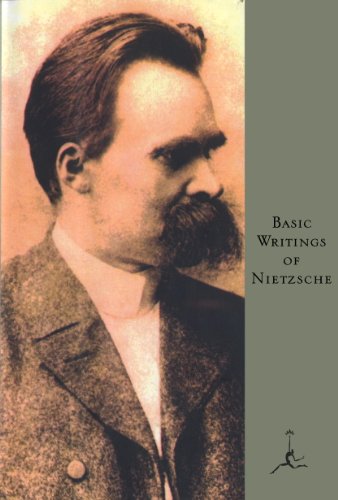
-
I Will Bear Witness: A Diary of the Nazi Years, 1933-1941
Victor Klemperer, Martin Chalmers
Paperback (Modern Library, Nov. 15, 1999)The publication of Victor Klemperer's secret diaries brings to light one of the most extraordinary documents of the Nazi period. "In its cool, lucid style and power of observation," said The New York Times, "it is the best written, most evocative, most observant record of daily life in the Third Reich." I Will Bear Witness is a work of literature as well as a revelation of the day-by-day horror of the Nazi years. A Dresden Jew, a veteran of World War I, a man of letters and historian of great sophistication, Klemperer recognized the danger of Hitler as early as 1933. His diaries, written in secrecy, provide a vivid account of everyday life in Hitler's Germany. What makes this book so remarkable, aside from its literary distinction, is Klemperer's preoccupation with the thoughts and actions of ordinary Germans: Berger the greengrocer, who was given Klemperer's house ("anti-Hitlerist, but of course pleased at the good exchange"), the fishmonger, the baker, the much-visited dentist. All offer their thoughts and theories on the progress of the war: Will England hold out? Who listens to Goebbels? How much longer will it last? This symphony of voices is ordered by the brilliant, grumbling Klemperer, struggling to complete his work on eighteenth-century France while documenting the ever- tightening Nazi grip. He loses first his professorship and then his car, his phone, his house, even his typewriter, and is forced to move into a Jews' House (the last step before the camps), put his cat to death (Jews may not own pets), and suffer countless other indignities. Despite the danger his diaries would pose if discovered, Klemperer sees it as his duty to record events. "I continue to write," he notes in 1941 after a terrifying run-in with the police. "This is my heroics. I want to bear witness, precise witness, until the very end." When a neighbor remarks that, in his isolation, Klemperer will not be able to cover the main events of the war, he writes: "It's not the big things that are important, but the everyday life of tyranny, which may be forgotten. A thousand mosquito bites are worse than a blow on the head. I observe, I note, the mosquito bites." This book covers the years from 1933 to 1941. Volume Two, from 1941 to 1945, will be published in 1999.
-
The Last Place on Earth: Scott and Amundsen's Race to the South Pole, Revised and Updated
Roland Huntford, Paul Theroux
Paperback (Modern Library, Sept. 7, 1999)At the beginning of the twentieth century, the South Pole was the most coveted prize in the fiercely nationalistic modern age of exploration. In the brilliant dual biography, the award-winning writer Roland Huntford re-examines every detail of the great race to the South Pole between Britain's Robert Scott and Norway's Roald Amundsen. Scott, who dies along with four of his men only eleven miles from his next cache of supplies, became Britain's beloved failure, while Amundsen, who not only beat Scott to the Pole but returned alive, was largely forgotten. This account of their race is a gripping, highly readable history that captures the driving ambitions of the era and the complex, often deeply flawed men who were charged with carrying them out. THE LAST PLACE ON EARTH is the first of Huntford's masterly trilogy of polar biographies. It is also the only work on the subject in the English language based on the original Norwegian sources, to which Huntford returned to revise and update this edition.
-
The Best Short Stories of Fyodor Dostoevsky
Fyodor Dostoevsky, David Magarshack
Paperback (Modern Library, Feb. 13, 2001)This collection, unique to the Modern Library, gathers seven of Dostoevsky's key works and shows him to be equally adept at the short story as with the novel. Exploring many of the same themes as in his longer works, these small masterpieces move from the tender and romantic White Nights, an archetypal nineteenth-century morality tale of pathos and loss, to the famous Notes from the Underground, a story of guilt, ineffectiveness, and uncompromising cynicism, and the first major work of existential literature. Among Dostoevsky's prototypical characters is Yemelyan in The Honest Thief, whose tragedy turns on an inability to resist crime. Presented in chronological order, in David Magarshack's celebrated translation, this is the definitive edition of Dostoevsky's best stories.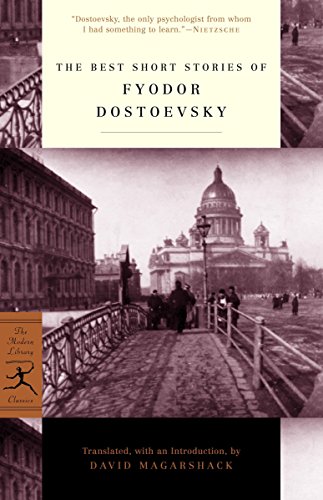
-
The Death and Life of Great American Cities: 50th Anniversary Edition
Jane Jacobs
Hardcover (Modern Library, Sept. 13, 2011)Published to coincide with the 50th anniversary of its initial publication, this special edition of Jane Jacobs’s masterpiece, The Death and Life of Great American Cities, features a new Introduction by Jason Epstein, the book’s original editor, who provides an intimate perspective on Jacobs herself and unique insights into the creation and lasting influence of this classic. The Death and Life of Great American Cities was described by The New York Times as “perhaps the most influential single work in the history of town planning. . . . [It] can also be seen in a much larger context. It is first of all a work of literature; the descriptions of street life as a kind of ballet and the bitingly satiric account of traditional planning theory can still be read for pleasure even by those who long ago absorbed and appropriated the book’s arguments.” Jane Jacobs, an editor and writer on architecture in New York City in the early sixties, argued that urban diversity and vitality were being destroyed by powerful architects and city planners. Rigorous, sane, and delightfully epigrammatic, Jane Jacobs’s tour de force is a blueprint for the humanistic management of cities. It remains sensible, knowledgeable, readable, and indispensable.
-
Guadalcanal Diary
Richard Tregaskis, Mark Bowden
Paperback (Modern Library, May 30, 2000)This celebrated classic gives a soldier's-eye-view of the Guadalcanal battles--crucial to World War II, the war that continues to fascinate us all, and to military history in general. Unlike some of those on Guadalcanal in the fall of 1942, Richard Tregaskis volunteered to be there. An on-location news correspondent (at the time, one of only two on Guadalcanal), he lived alongside the soldiers: sleeping on the ground--only to be awoken by air raids--eating the sometimes meager rations, and braving some of the most dangerous battlefields of World War II. He more than once narrowly escaped the enemy's fire, and so we have this incisive and exciting inside account of the groundbreaking initial landing of U.S. troops on Guadalcanal. With a new Introduction by Mark Bowden--renowned journalist and author of Black Hawk Down--this edition of Guadalcanal Diary makes available once more one of the most important American works of the war.